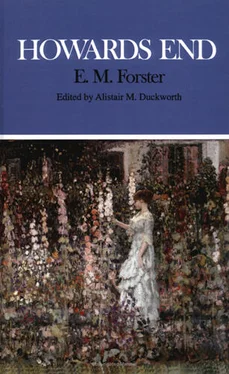Edward Morgan Forster - Howards End
Здесь есть возможность читать онлайн «Edward Morgan Forster - Howards End» весь текст электронной книги совершенно бесплатно (целиком полную версию без сокращений). В некоторых случаях можно слушать аудио, скачать через торрент в формате fb2 и присутствует краткое содержание. Жанр: Классическая проза, на английском языке. Описание произведения, (предисловие) а так же отзывы посетителей доступны на портале библиотеки ЛибКат.
- Название:Howards End
- Автор:
- Жанр:
- Год:неизвестен
- ISBN:нет данных
- Рейтинг книги:3 / 5. Голосов: 1
-
Избранное:Добавить в избранное
- Отзывы:
-
Ваша оценка:
- 60
- 1
- 2
- 3
- 4
- 5
Howards End: краткое содержание, описание и аннотация
Предлагаем к чтению аннотацию, описание, краткое содержание или предисловие (зависит от того, что написал сам автор книги «Howards End»). Если вы не нашли необходимую информацию о книге — напишите в комментариях, мы постараемся отыскать её.
Howards End — читать онлайн бесплатно полную книгу (весь текст) целиком
Ниже представлен текст книги, разбитый по страницам. Система сохранения места последней прочитанной страницы, позволяет с удобством читать онлайн бесплатно книгу «Howards End», без необходимости каждый раз заново искать на чём Вы остановились. Поставьте закладку, и сможете в любой момент перейти на страницу, на которой закончили чтение.
Интервал:
Закладка:
Perhaps some hint of her meaning did dawn on him. If so, he blotted it out. Straight from his fortress he answered: "I seem rather unaccommodating, but I have some experience of life, and know how one thing leads to another. I am afraid that your sister had better sleep at the hotel. I have my children and the memory of my dear wife to consider. I am sorry, but see that she leaves my house at once."
"You mentioned Mrs. Wilcox."
"I beg your pardon?"
"A rare occurrence. In reply, may I mention Mrs. Bast?"
"You have not been yourself all day," said Henry, and rose from his seat with face unmoved. Margaret rushed at him and seized both his hands. She was transfigured.
"Not any more of this!" she cried. "You shall see the connection if it kills you, Henry! You have had a mistress—I forgave you. My sister has a lover—you drive her from the house. Do you see the connection? Stupid, hypocritical, cruel—oh, contemptible! —a man who insults his wife when she's alive and cants with her memory when she's dead. A man who ruins a woman for his pleasure, and casts her off to ruin other men. And gives bad financial advice, and then says he is not responsible. These, man, are you. You can't recognize them, because you cannot connect. I've had enough of your unweeded kindness. I've spoilt you long enough. All your life you have been spoiled. Mrs. Wilcox spoiled you. No one has ever told what you are—muddled, criminally muddled. Men like you use repentance as a blind, so don't repent. Only say to yourself, 'What Helen has done, I've done.'"
"The two cases are different," Henry stammered. His real retort was not quite ready. His brain was still in a whirl, and he wanted a little longer.
"In what way different? You have betrayed Mrs. Wilcox, Helen only herself. You remain in society, Helen can't. You have had only pleasure, she may die. You have the insolence to talk to me of differences, Henry?"
Oh, the uselessness of it! Henry's retort came.
"I perceive you are attempting blackmail. It is scarcely a pretty weapon for a wife to use against her husband. My rule through life has been never to pay the least attention to threats, and I can only repeat what I said before: I do not give you and your sister leave to sleep at Howards End."
Margaret loosed his hands. He went into the house, wiping first one and then the other on his handkerchief. For a little she stood looking at the Six Hills, tombs of warriors, breasts of the spring. Then she passed out into what was now the evening.
Chapter 39
Charles and Tibby met at Ducie Street, where the latter was staying. Their interview was short and absurd. They had nothing in common but the English language, and tried by its help to express what neither of them understood. Charles saw in Helen the family foe. He had singled her out as the most dangerous of the Schlegels, and, angry as he was, looked forward to telling his wife how right he had been. His mind was made up at once: the girl must be got out of the way before she disgraced them farther. If occasion offered she might be married to a villain or, possibly, to a fool. But this was a concession to morality, it formed no part of his main scheme. Honest and hearty was Charles's dislike, and the past spread itself out very clearly before him; hatred is a skilful compositor. As if they were heads in a note-book, he ran through all the incidents of the Schlegels' campaign: the attempt to compromise his brother, his mother's legacy, his father's marriage, the introduction of the furniture, the unpacking of the same. He had not yet heard of the request to sleep at Howards End; that was to be their master-stroke and the opportunity for his. But he already felt that Howards End was the objective, and, though he disliked the house, was determined to defend it.
Tibby, on the other hand, had no opinions. He stood above the conventions: his sister had a right to do what she thought right. It is not difficult to stand above the conventions when we leave no hostages among them; men can always be more unconventional than women, and a bachelor of independent means need encounter no difficulties at all. Unlike Charles, Tibby had money enough; his ancestors had earned it for him, and if he shocked the people in one set of lodgings he had only to move into another. His was the leisure without sympathy—an attitude as fatal as the strenuous: a little cold culture may be raised on it, but no art. His sisters had seen the family danger, and had never forgotten to discount the gold islets that raised them from the sea. Tibby gave all the praise to himself, and so despised the struggling and the submerged.
Hence the absurdity of the interview; the gulf between them was economic as well as spiritual. But several facts passed: Charles pressed for them with an impertinence that the undergraduate could not withstand. On what date had Helen gone abroad? To whom? (Charles was anxious to fasten the scandal on Germany.) Then, changing his tactics, he said roughly: "I suppose you realize that you are your sister's protector?"
"In what sense?"
"If a man played about with my sister, I'd send a bullet through him, but perhaps you don't mind."
"I mind very much," protested Tibby.
"Who d'ye suspect, then? Speak out, man. One always suspects someone."
"No one. I don't think so." Involuntarily he blushed. He had remembered the scene in his Oxford rooms.
"You are hiding something," said Charles. As interviews go, he got the best of this one. "When you saw her last, did she mention anyone's name? Yes, or no!" he thundered, so that Tibby started.
"In my rooms she mentioned some friends, called the Basts—"
"Who are the Basts?"
"People—friends of hers at Evie's wedding."
"I don't remember. But, by great Scott! I do. My aunt told me about some tag-rag. Was she full of them when you saw her? Is there a man? Did she speak of the man? Or—look here—have you had any dealings with him?"
Tibby was silent. Without intending it, he had betrayed his sister's confidence; he was not enough interested in human life to see where things will lead to. He had a strong regard for honesty, and his word, once given, had always been kept up to now. He was deeply vexed, not only for the harm he had done Helen, but for the flaw he had discovered in his own equipment.
"I see—you are in his confidence. They met at your rooms. Oh, what a family, what a family! God help the poor pater—"
And Tibby found himself alone.
Chapter 40
Leonard—he would figure at length in a newspaper report, but that evening he did not count for much. The foot of the tree was in shadow, since the moon was still hidden behind the house. But above, to right, to left, down the long meadow the moonlight was streaming. Leonard seemed not a man, but a cause.
Perhaps it was Helen's way of falling in love—a curious way to Margaret, whose agony and whose contempt of Henry were yet imprinted with his image. Helen forgot people. They were husks that had enclosed her emotion. She could pity, or sacrifice herself, or have instincts, but had she ever loved in the noblest way, where man and woman, having lost themselves in sex, desire to lose sex itself in comradeship?
Margaret wondered, but said no word of blame. This was Helen's evening. Troubles enough lay ahead of her—the loss of friends and of social advantages, the agony, the supreme agony, of motherhood, which is even yet not a matter of common knowledge. For the present let the moon shine brightly and the breezes of the spring blow gently, dying away from the gale of the day, and let the earth, who brings increase, bring peace. Not even to herself dare she blame Helen. She could not assess her trespass by any moral code; it was everything or nothing. Morality can tell us that murder is worse than stealing, and group most sins in an order all must approve, but it cannot group Helen. The surer its pronouncements on this point, the surer may we be that morality is not speaking. Christ was evasive when they questioned Him. It is those that cannot connect who hasten to cast the first stone.
Читать дальшеИнтервал:
Закладка:
Похожие книги на «Howards End»
Представляем Вашему вниманию похожие книги на «Howards End» списком для выбора. Мы отобрали схожую по названию и смыслу литературу в надежде предоставить читателям больше вариантов отыскать новые, интересные, ещё непрочитанные произведения.
Обсуждение, отзывы о книге «Howards End» и просто собственные мнения читателей. Оставьте ваши комментарии, напишите, что Вы думаете о произведении, его смысле или главных героях. Укажите что конкретно понравилось, а что нет, и почему Вы так считаете.












